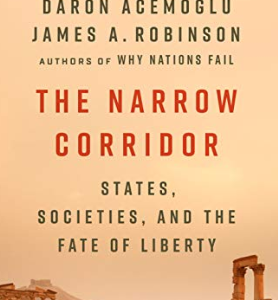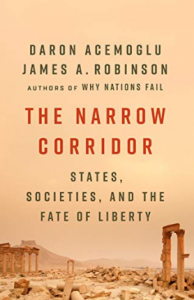
More demands are made when the state instills confidence to be more effective

MIT’s Daren Acemoglu and Chicago’s James Robinson authors of highly influential Why Nations Fail, provide an in-depth analysis of how to get there, It is hard, and liberty originates from a delicate balance of power between state and society.
Liberty is hardly the natural order of things as in most places and at most times, the strong have dominated the weak and human freedom has been quashed by force or by customs and norms. Liberty emerges only when a delicate and precarious balance is struck between state and society.
Liberty is neither granted by the state, nor seized from a state’s dead hand. It is the product of contestation and co-operation between state and society.
The book does not see freedom as merely the absence of state oppression, but corrosive of freedom are oppression of women by men, workers by bosses, or the poor by the rich.
The Leviathan of the 17th-century English political philosopher Thomas Hobbes was “Warre”, or “unending conflict, to provide security against lives, solitary, poore, nasty brutish, and short”, we require an all powerful state the Leviathan.
The opposite to the despotic leviathan is the “ Absent Leviathan” in some cases , a stateless society is indeed a war of all against all, as Hobbes feared, with the vendetta acting in place of the rule of law. In such societies blood-feuds may stretch over generations.
The alternative form of the Absent Leviathan a cage that uses social sanctions to force people to behave in accordance with norms. The norms appropriate to one’s place in a cast structure are an example. Such a cage of norms may also be oppressive. In the Despotic Leviathan there is too much state and too little society. In the Absent Leviathan, there is too much society and too little state. In between lies a corridor where things are neither too hot nor too cold. Here alone the state and society balance each other as one becomes more potent so does the other. “For Liberty to emerge and flourish both state and society must be strong” according to authors.
Denmark has a strong state and a strong society, which Acemoglu and Robinson call a Shackled Leviathan.
In western Europe they argue, profess towards a Shackled Leviathan began with the collapse of the Roman Empire, which bestowed institutional memories and the Church and also began with the deliberative assemblies of the Germanic tribes that had conquered Rome. These were “two blades of the European scissors.”
The more confidence people have in their state, the more they demand of it and so the more effective it becomes. Trust, not fear is the foundation of a strong state. So Despotic Leviathan is less able to act consistently and effectively than a Shackled one.
China is, historically the world’s most significant despotic Leviathan as it has struggled between two conceptions of such a state: Legalism, which imposes oppression on the people and Confucianism which emphasises obligations of rulers to the ruled. Yet the unconstrained Chinese state can never guarantee protection against its own changing whims.
Russia has gone back to despotism because society was inert. Vladimir Putin could re-impose the despotic Leviathan quite easily. Poland, with its relatively mobilised society, made great progress towards a shackled Leviathan. But Poland is on its way back towards the Despotic Leviathan, together with Hungary.
The Narrow Corridor: States, Societies, and the Fate of Liberty by Daron Acemoglu and James A Robinson, Viking £25, Penguin $32, 560 pages
